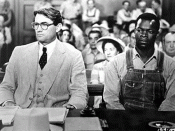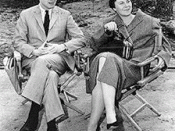How does prejudice affect justice? Is any human being truly capable of putting their preconceptions aside to judge a situation without bias? Is ÃÂjusticeÃÂ truly just if it is influenced by human nature? Subconsciously, we all know the answer to these questions. More difficult to understand is how and why prejudice and human nature affect the justice system.
Throughout history, prejudice has come in many different forms. In the novel ÃÂTo Kill a MockingbirdÃÂ, by Harper Lee, set in 1930s southern United States, we see the mindsets of many different types of people. There is the idea that black people are inferior to white, and also the pride of the black people ÃÂ as much as many white people feared and hated them, they feared and hated whites. We see the idea that a white manÃÂs word over a black manÃÂs must be the truth, or accepted as truth.
Prejudice is directed at the Ewells because they are white trash, Scout because she is a tomboy, and Atticus because he is, in the eyes of the town, a ÃÂnigger-loverÃÂ. Today, prejudice is just as widespread, and just as destructive. We are given the impression that Maori people are dole-bludgers, that people who wear black are depressed, suicidal Goths, and that all men are paedophiles ÃÂ demonstrated exceptionally by Air New ZealandÃÂs new policy, which states that men cannot be seated next to children who are travelling alone. These stereotypical views of groups who are different to us are neither fair nor accurate. Many Maori hold down jobs as well as white people, some people wear black because they are cold or all their coloured clothes are being washed, and the majority of men certainly donÃÂt fiddle with small children! And yet, we as humans set a stereotype for...



How Does Prejudice Affect Justice?
This is a remarkably sensitive, remarkably perceptive piece. It shows a great deal of compassion and understanding, and the presentation is excellent. Overall, a fine, fine piece of writing.
1 out of 1 people found this comment useful.